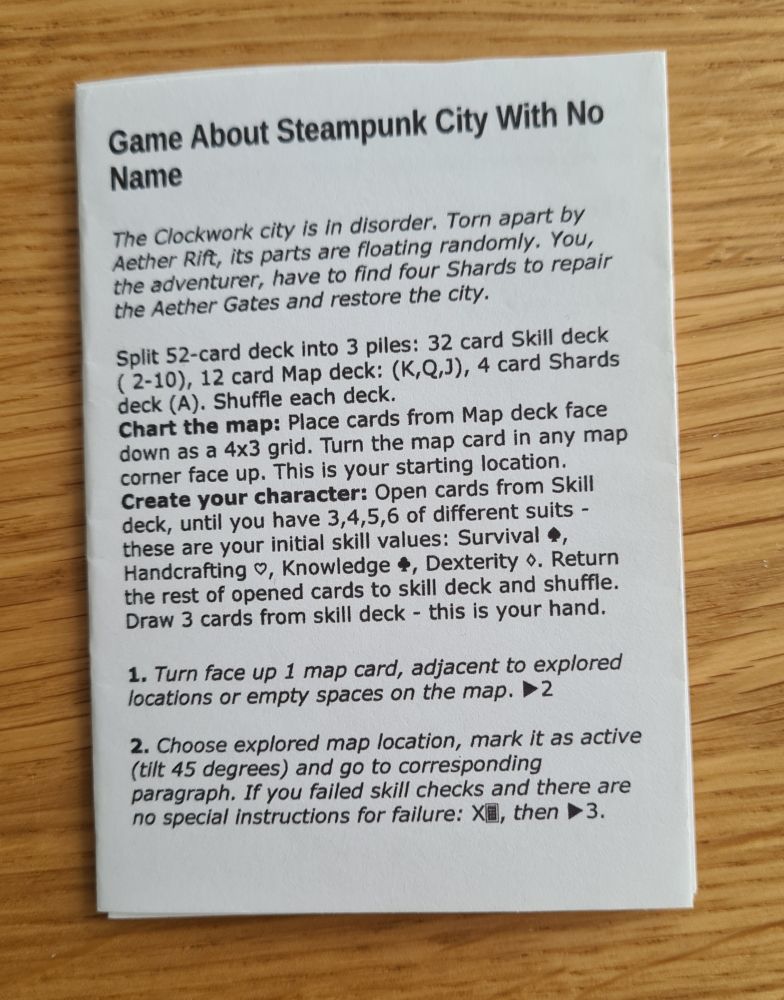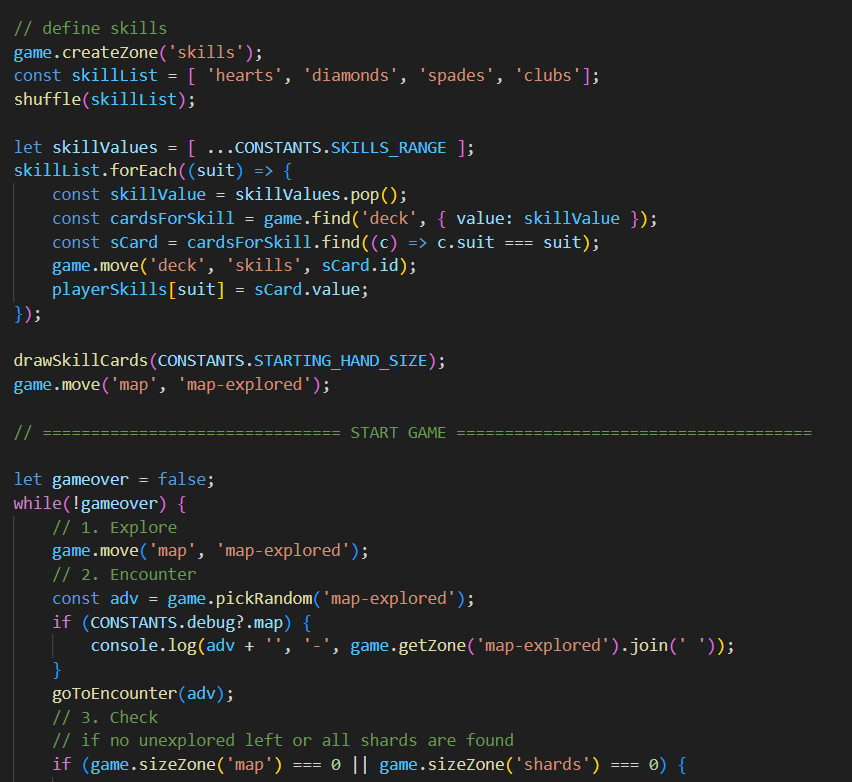Making of "After the Comet"
One of my interests is the demoscene. I've always been fascinated by how authors can pack so much stuff into such a small space. So when I read the terms of the Gamezine Jam, I couldn't help but take up the challenge. How to fit a game book on a single sheet of paper? How to create something interesting with a thousand words?
Idea
I immediately decided that the game book should have a gameplay similar to board games. Traditional mechanics based on randomness - for example, “roll a die and check the result” - create variety and different paths, but the player has no control over it. I wanted to give the player control, to make them feel that their decisions matter and they can influence events - but at the same time introduce some unpredictability and risk associated with it.
A deck of playing cards seemed like the perfect tool for me. Cards can be used in many ways - displaying resources and characteristics, generating randomness, and even creating a map of the area. So, inspired by the mechanics of the Arkham Horror card game, I sketched out a prototype of a role-playing system. The hero has four skills, each of which corresponds to a certain suit. To check a skill, the player must score a certain number of “successes” - that is, the required number of cards of that suit must fall out of the deck. And finally, the player has cards in his hand that they can add to the check to increase chances of success.
For these checks, cards from 2 to 10 are used. What to do with the rest? The face cards turned into a map of the area - they corresponded to the locations where the hero faced various trials. The aces became the “victory points” that had to be collected during the trials, and by collecting them all, the player won the game.
There were several different ideas on how to organize the locations, but in the end I settled on the option where the cards make a map, and the player gradually opens the locations on it. This is how the condition of losing the game appeared: if the player has opened all the locations and has not collected four aces.
Prototype
I sat down and quickly wrote a prototype of the game to check how all these ideas would work in practice. I decided that it would be an abandoned steampunk city, and the player would collect shards of a crystal. What locations can there be in it? A palace, a fortress, a bank, a market, a port, residential areas, a factory... I described the trials in the locations in a very generic way (“you found a safe”, “you are in a workshop with mysterious devices”, “there is a cargo container here”). After naming the game “A game about a steampunk city with no name” and playing it a couple of times, I let my friends test it.

The result was disappointing. The game turned out to be quite difficult - during their adventures my friends were able to find only a couple of shards, and in one of the playthroughs just one check was successful. In addition, the game severely punished failures. So if the player was unlucky from the start, the chances of completing the game decreased significantly with each turn, and the player could not influence this in any way.
Balancing the game manually is not so easy, so it's time for automatic playtests to join the party.
Automaton
After a couple of days, I had about 30 kilobytes of JavaScript code that could play my game many times according to the rules I set. And here it is, the moment of truth - the first run of the simulation:
Shards found: 0 1 2 3 4
59.13% 33.8% 6.53% 0.54% 0.02%
Wait, what? Only one out of five thousand attempts to complete the game will be successful? Oh, no, it's a bug in the code, and I forgot to code one of the game mechanics. Let's try again... in fact, the chances of winning are 0.23%. That's not good either.
But now I have an assistant who can play by my rules and not get tired! So I started to gradually change the rules and see how these changes affect the gameplay and the chances of winning the game. Some experiments were unsuccessful, but gradually I was getting closer to the desired outcome.
The main problem was the skill checks, their complexity was almost impossible to balance: one success was very easy, two was mediocre, three was very difficult, and four was almost impossible. But I liked this mechanic for its simplicity, so I decided that it should remain unchanged.
The best idea that significantly improved the gameplay was getting a card when a player fails a check, so the chance of a failed check decreases over time. Also, increasing the starting skill levels of the character has had a significant impact on the difficulty.

Text
Now that the game is finally enjoyable to play, it's time to tidy up the text. Locations were given their own names, descriptions of adventures became more atmospheric and detailed, and the wording of the game rules became clearer.
But the game still lacked the main thing - a plot that would connect all the adventures. What exactly does the hero collect? Why is the city abandoned, what happened to it? Why is the hero doing all this? And, most importantly, how to tell the story in order when the player's path through the locations is always different?
To answer all of these questions, I had to research the Internet and assemble a plot from the pieces of stories and games I liked. A rather simple technique helped me to present it consistently: with each shard found, the player received another plot paragraph, and with the last shard, they finally learned the story in full.
The text formatting also went through a series of iterations - experiments with fonts, text placement, symbols, and icons. The online service PDFImpose was a great help for zine formatting. I simply created a document with an A7 page size, and this service placed them on an A4 sheet as needed.
Final
After the publication and the first reviews, it became clear that I had succeeded in my plan. An intense gaming experience with a minimalist story, in my opinion, best suits the idea of this jam. The game gave a sense of exploration through the gradual discovery of the map, progression through character leveling and plot revelation as you progressed, and the importance of decisions through the players’ impact on skill checks.
It was my first experience with creating physical game books. Developing the game and solving game design problems was incredibly interesting, and finding solutions that would help fit within the constraints was exciting. I think I will return to this format again 🙂.
Get After the Comet
After the Comet
Print-and-play adventure in the abandoned steampunk city
| Status | Released |
| Category | Physical game |
| Author | techniX |
| Genre | Card Game, Interactive Fiction |
| Tags | Board Game, Print & Play, solitaire, Steampunk |
| Languages | English, Ukrainian |
More posts
- Post-jam updateMar 23, 2025
- Створення “Після комети”Mar 15, 2025
Leave a comment
Log in with itch.io to leave a comment.